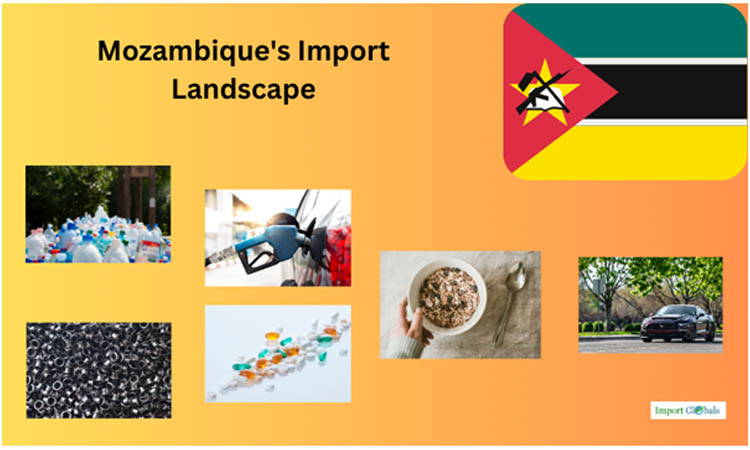
- Jun 23, 2025
Mozambique's Import Landscape: A Detailed Review
The expanding economy of Mozambique, which is located in southeast Africa, depends more and more on imports to meet its needs for industrial, energy, and food security. According to Import Globals' Mozambique Import Data, the country is a quickly developing one with a changing trade landscape. Several important factors impact the flow of commodities into the country. While taking into account the strategic ramifications and difficulties the nation faces, this blog will examine Mozambique's economic data, import values, product categories with HS codes, main trading partners, import trends, and forecast outlook.
Key Economic Indicators for Mozambique
According to Import Globals' Mozambique Export Data, political unrest, natural disasters, and the state of the world economy have all had an impact on the country's economy, which has seen varying growth rates. The main economic indicators over the previous five years are listed below:
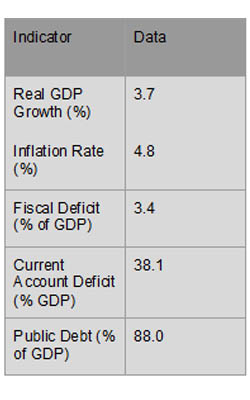
Analysis of Economic Indicators
Real GDP Growth: The epidemic caused Mozambique's GDP to expand negatively in 2020, but in the years that followed, it recovered, reaching 4.2% in 2022. However, this recovery has been slower than anticipated, with a modest 3.7% forecast for 2024, according to Mozambique Import Export Trade Data From Import Globals.
Inflation Rate: Rising fuel prices and food shortages were the main causes of the 10.3% inflation rate in 2022. Although the government has tried, it is still difficult to control inflation.
Fiscal Deficit & Public Debt: Mozambique's capacity to finance imports is constrained by the country's persistently high fiscal deficit and public debt ratios. To strengthen fiscal health, structural reforms are required.
Current Account Deficit: Mozambique's huge and highly variable current account deficit is a result of its trade imbalance. Increasing export earnings and controlling the import bill are essential to efforts to lower the deficit.
Values of Imports from Mozambique (2020–2024)
Over the previous five years, Mozambique's imports have varied, mostly due to changes in domestic demand, infrastructure development, and worldwide commodity prices.
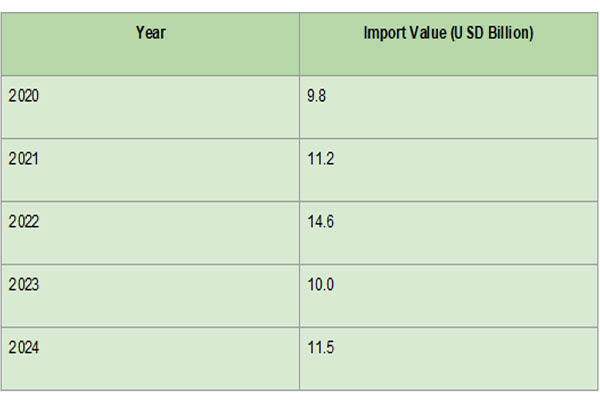
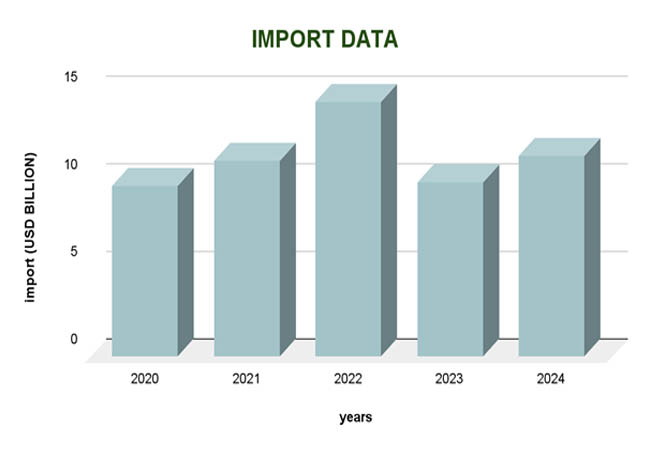
In-depth Evaluation
2020: The worldwide pandemic and ensuing economic slump caused a sharp decline in imports. Import volumes decreased as a result of supply chain interruptions and a decline in the market for luxury products.
2021-2022: According to Mozambique Import Custom Data From Import Globals, there was a recovery phase from 2021 to 2022, with 2022 being the peak year because of the high demand for energy, machinery, and agricultural items.
2023: According to Import Globals' Mozambique Import Trade Analysis, the import value fell back to $10 billion, mostly as a result of decreased demand after domestic issues such as logistical limitations and political unrest.
2024: Infrastructure improvements, energy requirements, and expansion in manufacturing and agriculture are anticipated to drive a modest increase.
Top Import Product Categories
Mozambique imports a variety of products, with energy-related goods, machinery, and food products dominating the import landscape.
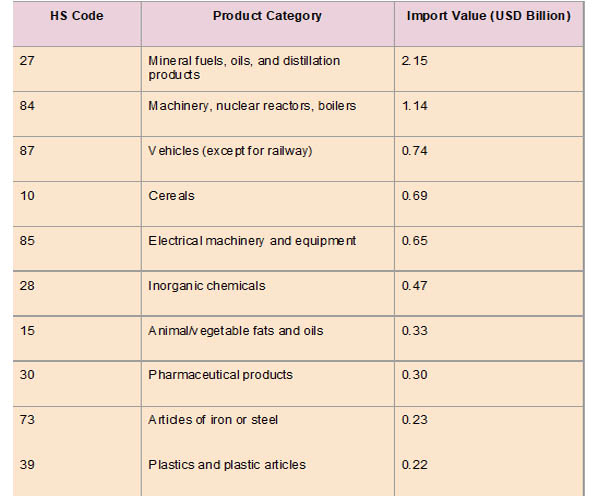
Mineral Oils and Fuels ( HS 27): According to Import Globals' Mozambique Export Data, this group comprises natural gas, coal, petroleum oils, and crude oil. These fuels are essential for industry, transportation, and power generation. Because of its low capacity for refining these items domestically, Mozambique imports large amounts of them.
Boilers, Nuclear Reactors, and Machinery (HS 84): Mozambique's industrial and infrastructural sectors depend heavily on the import of machinery, such as engines, turbines, and mechanical appliances, according to the Mozambique Import Data. This also includes specialized equipment for power generation, construction, and mining.
Automobiles (Apart From Railroads) ( HS 87): Automobiles such as buses, lorries, passenger cars, and farm equipment are imported into Mozambique. For rural development, logistics, and transportation, this category is essential.
Cereals(HS 10): According to research by Import Globals on Mozambique Import Trade Statistics, the nation's food security requirements are largely met by imported grains, particularly rice, maize, and wheat. Due to inadequate indigenous production, wheat and rice are mostly imported, but maize is produced locally to a considerable extent.
Electrical Machinery & Equipment (HS 85): This category of imports includes communication devices, cables, generators, and electrical transformers. These are necessary for the development of Mozambique's telecommunications and energy infrastructure.
Inorganic Chemicals (HS 28): According to Mozambique Import Shipment Data, the country imports chemicals for a range of industrial uses, including as manufacturing processes, mining raw materials, and fertilizers for agriculture.
Vegetable or Animal Fats and Oils (HS 15): For Mozambique's food processing sectors, such as cooking and soap production, edible oils like palm and soybean oils are essential. Additionally, these oils are imported for use in industry and cosmetics.
Pharmaceutical Products (HS 30): The expanding healthcare system in Mozambique necessitates the importation of medications, such as medical gadgets, vaccinations, and antibiotics. These goods are essential for preventing illness and promoting public health.
Iron or Steel Articles(HS 73): According to Import Globals' Mozambique Import Export Trade Analysis, this category comprises steel goods utilized in industry, infrastructure, and building, such as pipes, beams, and rods. The manufacturing and construction sectors of Mozambique are supported by these imports.
Articles and Plastics (HS 39): As a result, Mozambique imports a range of plastic goods, including building supplies and packaging materials. The expanding manufacturing, construction, and retail industries depend on these.
Important Import Partners
A wide variety of items, including consumer goods, machinery, industrial inputs, and energy products, are supplied by Mozambique's main import partners. An outline of these partners can be seen below:
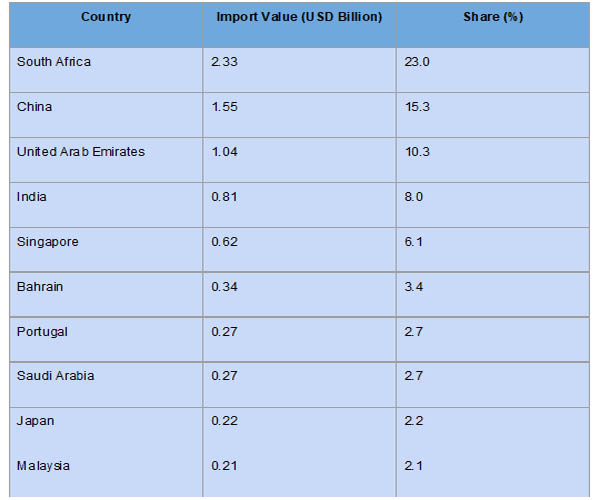
South Africa
South Africa, Mozambique's main import partner, provides chemicals, automobiles, and machinery. Due to the Southern African Development Community (SADC) and the close proximity, imports are more economical and efficient.
China
Mozambique imports textiles, construction materials, electronics, and machinery from China. The Chinese government has also made significant investments in Mozambique's infrastructure, making it an essential partner for economic development, according to Import Globals' Mozambique Import Export Trade Analysis.
Abu Dhabi, United Arab Emirates
The United Arab Emirates is a significant supplier of chemicals and refined petroleum. Additionally, commerce in luxury items, technology, and machinery supports Mozambique's industrial expansion and strengthens the partnership.
India
Pharmaceuticals, textiles, and agricultural equipment are among the goods that India sells to Mozambique; these goods are vital to the country's farming sector and healthcare system.
Singapore
According to an Import Globals Study on Mozambique Export Import Global Trade Data, Singapore acts as a hub for re-exporting goods to Mozambique, including machinery, electrical components, and refined petroleum. Singapore is a desirable trading partner due to its ease of doing business.
Bahrain
The primary exports from Bahrain are refined fuels and aluminum products, both of which are essential for Mozambique's building and energy sectors.
Portugal
Portugal continues to be a significant trading partner of Mozambique because of its colonial past. It supports Mozambique's industrial and food security sectors by supplying vehicles, machinery, and food items.
Saudi Arabia
According to the Mozambique Import Export Global Data, Saudi Arabia is a major provider of chemicals and petroleum to Mozambique, which helps the country meet its manufacturing and energy needs.
Japan
High-end machinery, automobiles, and electronics are produced in Japan. Because of their dependability and technological innovation, Mozambique imports Japanese goods to boost its industrial and transportation sectors.
Malaysia
Malaysia provides palm oil, electronics, and machinery that are necessary for Mozambique's food processing and technical development, according to an Import Globals Study on Mozambique Import Data.
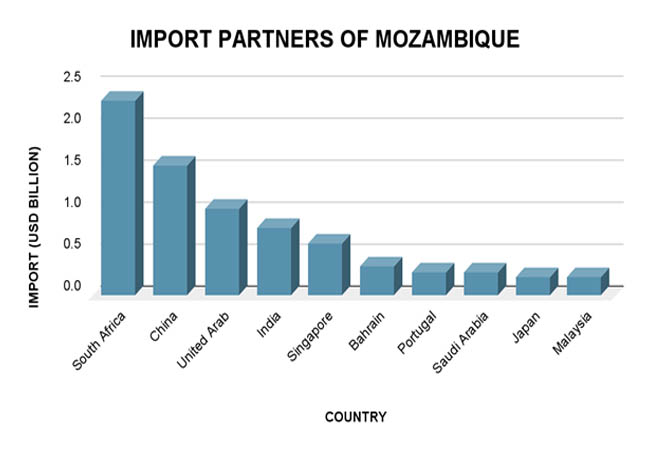
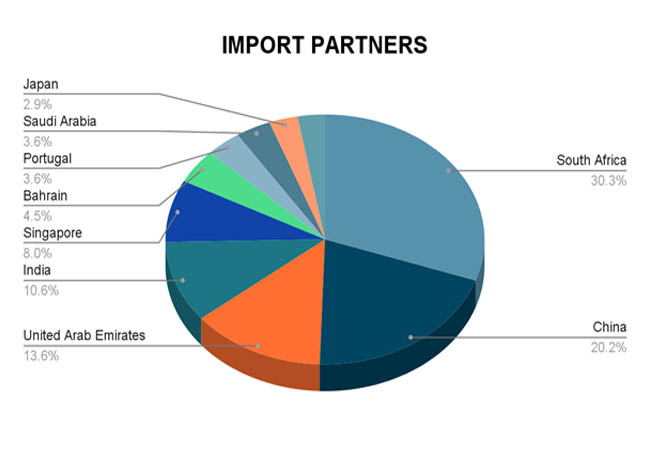
Forecast Analysis
Several variables indicate that Mozambique's imports will likely keep increasing.
Infrastructure Development: As a result of the government's emphasis on ports, highways, and energy production, there will be a greater need for construction supplies and equipment.
Energy Needs: According to Import Globals' Mozambique Import Export Trade Data, Mozambique's demand for energy goods, such as natural gas and refined petroleum, will continue to rise as the country becomes more industrialized.
Consumer Items: As the middle class grows, more cars, technology, and consumer items will be imported.
Strategic Consequences
Mozambique's import environment presents several opportunities and difficulties, including:
Diversification of Import Sources: In order to lessen its reliance on a small number of nations, Mozambique needs to try to diversify its import sources, especially for essential items like machinery and petroleum.
Domestic output: To lessen reliance on imports and encourage self-sufficiency, the government should prioritize increasing domestic output, particularly in manufacturing and agriculture, according to Mozambique Import Custom Data by Import Globals.
Logistics and Infrastructure Development: In order to facilitate the movement of commodities, Mozambique's import growth depends on the development of port infrastructure, road networks, and storage facilities.
Trade Agreements: Improving ties with the European Union, the African Union, and SADC can result in better trade terms and more import predictability.
In conclusion
Mozambique's structural development and economic growth are intimately related to its import trade analysis. The nation has enormous potential to boost its economy by increasing local output, diversifying its suppliers, and enhancing trade infrastructure, but it also confronts tremendous hurdles in managing its reliance on imports. Mozambique can develop an import industry that is more robust and self-sufficient by concentrating on strategic efforts.
If you are looking for detailed and up-to-date Mozambique Import Data, you can contact IMPORT GLOBALS.
FAQs
Que. What are the most popular imports from Mozambique?
Ans. Electrical equipment, automobiles, machines, grains, and mineral fuels.
Que. Which major import partners are there?
Ans. Singapore, India, China, South Africa, and the United Arab Emirates.
Que. What caused Mozambique's 2023 imports to drop?
Ans. Because of supply chain interruptions, civil upheaval, and a decline in domestic demand.
Que. How can Mozambique lessen its reliance on imports?
Ans. Through enhancing infrastructure, diversifying suppliers, and funding domestic manufacturing.
Que. How do imports look over the next three years?
Ans. Steady increase; assuming stable economic conditions, imports are expected to reach $14 billion by 2027.
Que. Where to obtain detailed Mozambique Import Data?
Ans. Visit www.importglobals.com or email info@importglobals.com for more information on up-to-date Mozambique Import Data.
